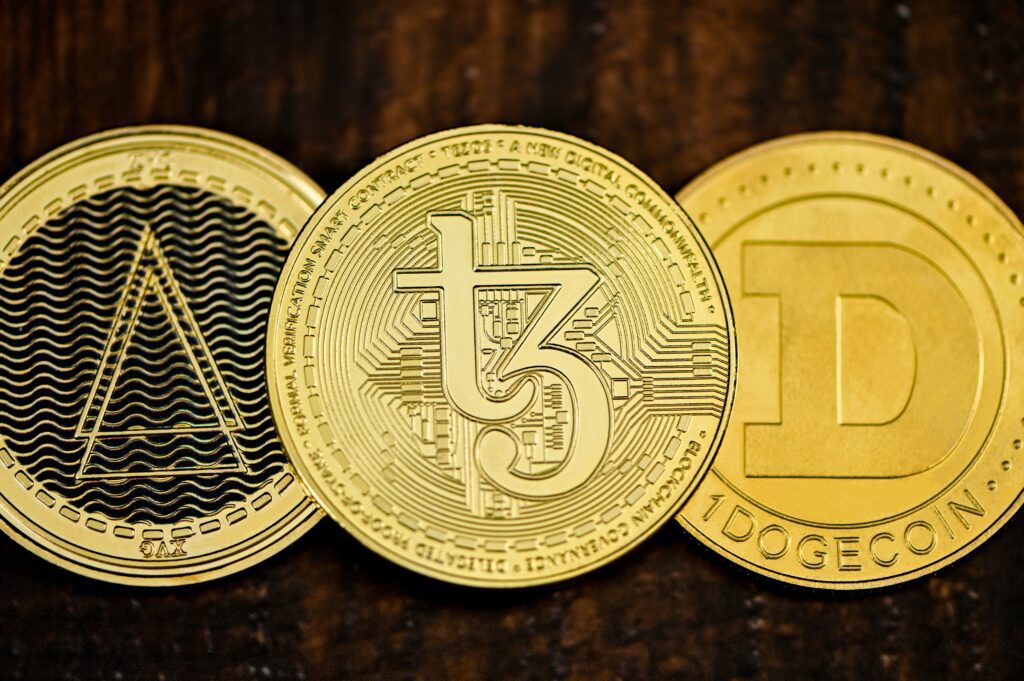If you’ve ever been curious about the revolutionary world of blockchain technology and cryptocurrencies, now is the perfect time to dive in and educate yourself. Understanding the fundamentals of blockchain and how cryptocurrencies work can help demystify these complex concepts and open up exciting opportunities for investment, technological advancements, and personal growth. In this article, we’ll explore the basics of blockchain technology and demystify the workings of cryptocurrencies, giving you a solid foundation to build upon as you embark on your journey into this fascinating realm. So, grab a cup of coffee, sit back, and let’s get started on this educational adventure together.
Understanding Blockchain Technology
What is blockchain technology?
Blockchain technology is a revolutionary concept that has gained significant attention in recent years. At its core, blockchain is a decentralized and distributed ledger that records transactions across multiple computers in a transparent and secure manner. Unlike traditional centralized systems, where a single entity has control over the data, blockchain allows for a peer-to-peer network where all participants have access to the same information.
How does blockchain technology work?
Blockchain technology operates on the principle of consensus. When a new transaction is initiated, it is broadcasted to the network of computers, or nodes, for verification. These nodes work together to validate the transaction by solving complex mathematical problems. Once a consensus is reached, the transaction is added to a block, which is then linked to the previous blocks in a chronological order, forming a chain of blocks, hence the name “blockchain”.
Key features of blockchain technology
Blockchain technology boasts several key features that make it unique and desirable for various applications. One of the most prominent features is its immutability. Once a transaction is recorded on the blockchain, it is nearly impossible to alter or delete it, ensuring the integrity of the data. Additionally, blockchain technology provides transparency, as all participants in the network have access to the same information, promoting accountability and trust. Furthermore, blockchain is decentralized, meaning there is no central authority or intermediary controlling the system, reducing the risk of single point failures and enhancing security.
Blockchain Technology and Cryptocurrencies
What are cryptocurrencies?
Cryptocurrencies are digital or virtual currencies that utilize cryptographic technology to secure and verify transactions. They exist solely in digital form and are not regulated or issued by any central authority, such as a government or financial institution. The decentralized nature of cryptocurrencies, enabled by blockchain technology, allows for peer-to-peer transactions without the need for intermediaries.
How are cryptocurrencies created?
Cryptocurrencies are typically created through a process called “mining”. Mining involves using computational power to solve complex mathematical problems that validate transactions on the blockchain network. As a reward for successfully mining a block, miners are given a certain amount of the cryptocurrency as well as transaction fees.
How do cryptocurrencies use blockchain technology?
Blockchain technology serves as the underlying infrastructure for cryptocurrencies. Each cryptocurrency has its own unique blockchain, which records and verifies all transactions made using the currency. The decentralized nature of the blockchain ensures that transactions are secure, transparent, and resistant to tampering.
Popular cryptocurrencies
There are thousands of cryptocurrencies in existence today, but some of the most well-known and widely used ones include Bitcoin (BTC), Ethereum (ETH), Ripple (XRP), Litecoin (LTC), and Bitcoin Cash (BCH). These cryptocurrencies have gained significant popularity and market capitalization due to their innovative technologies, widespread adoption, and potential for financial gain.

Benefits and Potential of Blockchain Technology
Increased security and transparency
One of the most significant advantages of blockchain technology is its enhanced security. Due to its decentralized structure, where transactions are verified and recorded by multiple participants, it is nearly impossible for hackers to manipulate or tamper with the data. This increased security has the potential to revolutionize industries such as finance and healthcare, where sensitive information needs to be protected.
Moreover, blockchain technology also offers greater transparency. As all participants in the network have access to the same information, it becomes easier to track and trace transactions, reducing the risk of fraud and corruption.
Decentralization and elimination of intermediaries
The decentralized nature of blockchain technology eliminates the need for intermediaries or third parties in transactions. This not only reduces costs and delays but also eliminates the risk of single point failures and potential manipulation by intermediaries. Users can directly engage in peer-to-peer transactions, bypassing traditional financial institutions and intermediaries.
Immutable and tamper-proof records
Once a transaction is recorded on the blockchain, it becomes virtually impossible to alter or delete it. This immutability of blockchain records ensures the integrity and permanence of the data. This feature can be particularly valuable in areas such as supply chain management, where the traceability and authenticity of products are crucial.
Potential applications in various industries
Blockchain technology has the potential to transform various industries beyond cryptocurrencies. It can be used for supply chain management, where it can provide transparency and traceability throughout the entire supply chain. Additionally, it can be utilized in identity verification and authentication systems, where it can streamline processes and enhance security. Digital voting systems can also benefit from blockchain technology, ensuring the integrity and transparency of the voting process.
Challenges and Limitations of Blockchain Technology
Scalability issues
One of the biggest challenges facing blockchain technology is scalability. As more transactions are added to the blockchain, the size of the chain grows, making it increasingly difficult and resource-intensive to maintain and validate the network. This issue becomes more pressing as blockchain adoption increases and the number of transactions escalates. Blockchain developers are actively working on solutions to improve scalability, such as implementing off-chain transactions or using alternative consensus mechanisms.
Energy consumption and environmental impact
Blockchain networks, particularly those that use proof-of-work (PoW) consensus mechanisms, require significant computational power and energy consumption. This has raised concerns about the environmental impact of blockchain technology. As the popularity of cryptocurrencies and blockchain applications grows, it becomes crucial to develop more energy-efficient consensus mechanisms and sustainable practices to mitigate these concerns.
Regulatory and legal uncertainties
The regulatory framework surrounding blockchain technology and cryptocurrencies is still evolving. The lack of clear regulations and legal uncertainties in different jurisdictions can pose challenges for businesses and individuals operating in the space. As governments and regulatory bodies strive to catch up and understand the implications of blockchain technology, it is important for stakeholders to stay informed and adapt to changing regulations.
Lack of standardization and interoperability
Due to the relatively nascent stage of blockchain technology, there is a lack of standardization and interoperability among different blockchain networks. This fragmentation can hinder the seamless transfer of data and assets between different blockchains. Efforts are being made to develop interoperability protocols and standards to facilitate collaboration and integration across blockchain platforms.

Getting Started with Cryptocurrencies
Setting up a digital wallet
To start using cryptocurrencies, you will need a digital wallet. A digital wallet is a software program that allows you to securely store, send, and receive cryptocurrencies. There are various types of wallets, including web-based wallets, mobile wallets, desktop wallets, and hardware wallets. It is important to choose a wallet that suits your needs and offers robust security measures.
Choosing a cryptocurrency exchange
In order to buy or sell cryptocurrencies, you will need to use a cryptocurrency exchange. Cryptocurrency exchanges are online platforms that facilitate the buying and selling of cryptocurrencies for traditional fiat currencies or other cryptocurrencies. It is essential to research and choose a reputable and trustworthy exchange that offers a user-friendly interface and robust security measures.
Understanding private and public keys
Private and public keys are essential components of cryptocurrency transactions. A private key is a secret code that allows you to access and manage your cryptocurrency holdings. It should be kept secure and never shared with anyone. Public keys, on the other hand, are cryptographic codes that are used to receive cryptocurrency payments. They can be safely shared with others to receive funds.
Security best practices
When dealing with cryptocurrencies, it is crucial to prioritize security. Some security best practices include using strong and unique passwords, enabling two-factor authentication, regularly updating your software, and being cautious of phishing attempts and malicious websites. It is also advisable to keep backups of your wallet and regularly update yourself on the latest security measures and developments in the field.
Types of Cryptocurrencies
Bitcoin (BTC)
Bitcoin, introduced in 2009, is the first and most well-known cryptocurrency. It operates on a decentralized peer-to-peer network and is characterized by its scarcity and limited supply of 21 million coins. Bitcoin has gained significant popularity as a digital store of value and a means of transferring funds globally.
Ethereum (ETH)
Ethereum is a decentralized platform that enables the creation and execution of smart contracts and decentralized applications (DApps). It introduced the concept of programmable blockchain, allowing developers to build their own blockchain-based applications. Ethereum’s native cryptocurrency, Ether (ETH), is used to power transactions and execute smart contracts within the network.
Ripple (XRP)
Ripple is a cryptocurrency and a payment protocol designed for fast and low-cost international money transfers. Unlike many other cryptocurrencies, Ripple does not rely on mining and operates on a centralized network. Its native cryptocurrency, XRP, is used as a bridge currency for transferring value between different fiat currencies.
Litecoin (LTC)
Litecoin is a peer-to-peer cryptocurrency that was created in 2011 as a “lite” version of Bitcoin. It aims to improve upon Bitcoin’s shortcomings, such as transaction speed and scalability. Litecoin utilizes a different proof-of-work algorithm, enabling faster block generation and transaction confirmation.
Bitcoin Cash (BCH)
Bitcoin Cash is a cryptocurrency that was created in 2017 as a result of a hard fork from Bitcoin. It aimed to increase the block size limit of the Bitcoin blockchain, allowing for faster transaction processing and lower fees. Bitcoin Cash follows a similar decentralized and peer-to-peer model as Bitcoin.

Investing in Cryptocurrencies
Understanding market fluctuations
Investing in cryptocurrencies comes with inherent volatility and market fluctuations. Cryptocurrency prices can be highly volatile, experiencing rapid price movements within short periods. Understanding the factors that influence cryptocurrency prices, such as market demand, regulations, investor sentiment, and technological developments, can help investors make informed decisions.
Creating an investment strategy
Developing an investment strategy is crucial before entering the cryptocurrency market. This includes setting clear investment goals, determining risk tolerance, and establishing a diversified portfolio. It is important to conduct thorough research, consider expert advice, and stay updated on market trends to make informed investment decisions.
Evaluating different cryptocurrencies
When evaluating different cryptocurrencies, it is essential to consider factors such as the team behind the project, the technology and innovation it offers, the market demand and adoption, and the potential for growth and scalability. Conducting a thorough analysis and due diligence can help investors identify promising cryptocurrencies with long-term potential.
Risks and considerations
Investing in cryptocurrencies carries certain risks that investors should be aware of. These risks include market volatility, regulatory uncertainties, technological vulnerabilities, and potential scams or fraudulent projects. It is crucial to only invest what you can afford to lose and to seek professional advice if needed. Staying updated on industry news and developments can help mitigate risks and make informed investment decisions.
Cryptocurrency Mining
What is cryptocurrency mining?
Cryptocurrency mining is the process of validating and adding new transactions to the blockchain by solving complex mathematical problems. Miners compete against each other to solve these puzzles and are rewarded with newly minted cryptocurrencies, as well as transaction fees, for their efforts.
Proof of Work (PoW) vs. Proof of Stake (PoS)
Cryptocurrency networks typically operate on either a proof-of-work (PoW) or proof-of-stake (PoS) consensus mechanism. PoW requires miners to solve computational puzzles to validate transactions, while PoS relies on participants holding a certain amount of the cryptocurrency to confirm transactions. Each mechanism has its own advantages and drawbacks, and different cryptocurrencies may adopt different mechanisms.
Mining hardware and software
To mine cryptocurrencies, miners require specialized hardware and software. In the early days, mining could be done using regular CPUs or GPUs, but as the difficulty of mining increased, dedicated mining hardware called ASICs (Application-Specific Integrated Circuits) became necessary for certain cryptocurrencies. Additionally, miners need mining software that connects them to the cryptocurrency network and enables them to participate in the mining process.
Costs and profitability
Cryptocurrency mining can be financially rewarding, but it also carries costs and considerations. Miners need to factor in the cost of hardware, electricity, cooling systems, and maintenance. Additionally, profitability can fluctuate based on factors such as the price of the cryptocurrency, the mining difficulty, and the efficiency of the mining equipment. It is crucial for miners to calculate the potential costs and rewards before getting involved in mining.

Blockchain Technology Beyond Cryptocurrencies
Smart contracts and decentralized applications (DApps)
Blockchain technology enables the creation and execution of smart contracts, which are self-executing contracts with the terms and conditions directly written into the code. These smart contracts can automate processes, eliminate the need for intermediaries, and ensure transparency and security. Furthermore, blockchain enables the development of decentralized applications (DApps) that leverage the advantages of blockchain technology, such as enhanced security and immutability.
Supply chain management
In the supply chain industry, blockchain technology has the potential to increase transparency and traceability. Through blockchain, stakeholders can track and verify the origin, movement, and authenticity of goods, reducing the risk of counterfeit products and promoting fair trade practices. This can revolutionize industries such as food and pharmaceuticals, where supply chain transparency is critical.
Identity verification and authentication
Blockchain technology offers a secure and decentralized solution for identity verification and authentication. By using blockchain, individuals can have greater control over their personal data and share it securely, without the need for centralized authorities. This can have a significant impact on areas such as digital identity, authentication processes, and privacy protection.
Digital voting systems
Blockchain technology has the potential to revolutionize digital voting systems by enhancing transparency, security, and trust. By utilizing blockchain, the voting process can be made more tamper-proof, as each vote is recorded on the blockchain and cannot be altered. This can potentially eliminate concerns of voter fraud and increase public trust in the electoral process.
Staying Informed and Continued Learning
Following reputable sources and industry experts
To stay informed about blockchain technology and cryptocurrencies, it is important to follow reputable sources and industry experts. Regularly reading news articles, blogs, and research papers from trusted publications can help you stay updated on the latest developments, trends, and regulatory changes in the field.
Joining online communities and forums
Engaging in online communities and forums dedicated to blockchain and cryptocurrencies can provide valuable insights and opportunities for discussion with like-minded individuals. These communities are often filled with experts, enthusiasts, and professionals who are willing to share their knowledge and experiences.
Attending conferences and events
Attending conferences, seminars, and events related to blockchain technology and cryptocurrencies can offer valuable networking opportunities and access to industry-leading experts. These events often feature keynote speeches, panel discussions, and workshops where you can deepen your knowledge and gain insights from industry leaders.
Exploring educational resources and courses
As blockchain technology and cryptocurrencies gain mainstream attention, numerous educational resources and courses have emerged. These resources can help beginners understand the basics of blockchain technology and provide in-depth knowledge for those looking to specialize. Online platforms, universities, and industry organizations offer a variety of courses and certifications catered to different skill levels and interests.
By starting with the basics and delving into the intricacies of blockchain technology and cryptocurrencies, you can equip yourself with the knowledge necessary to navigate this rapidly evolving field. Whether you are a beginner looking to explore blockchain and cryptocurrencies or an experienced individual seeking further insights, continuous learning and staying informed will be key to your success in this exciting realm.


